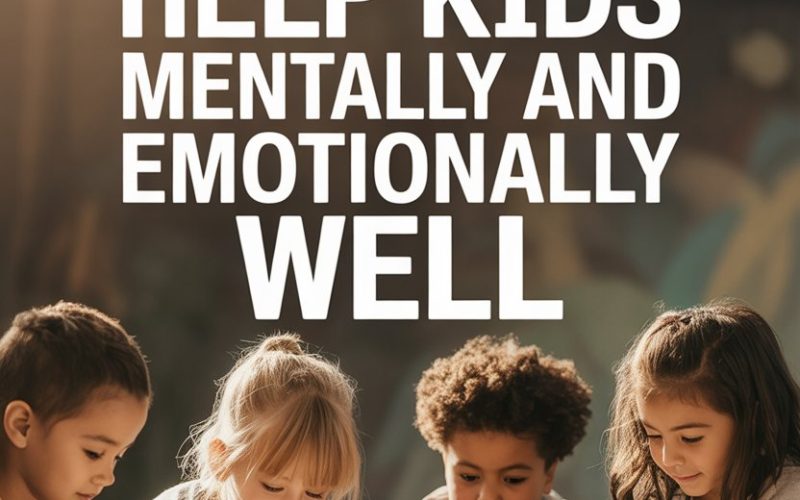Parenting these days can feel like juggling chainsaws while riding a unicycle—blindfolded.
Between work, school runs, and figuring out what on earth “griddy” means, it’s easy to worry if your child’s emotional wellbeing is quietly slipping down the to-do list.
Fear not. Supporting your child’s mental and emotional health might be simpler (and less time-consuming) than you think.
Make Talking About Feelings as Normal as Peanut Butter Sandwiches
Kids are emotional little creatures. Sometimes the day’s drama is about a lost pencil, other times it’s about who got to be line leader.
The trick is to let them know all feelings are fair game for discussion.
Sit down together at dinner or while folding socks—no need for a formal therapy session. A
sk questions beyond “How was your day?” Try “What was the funniest thing that happened?” or “Was there a time today you felt a bit wobbly inside?” (You might be surprised by the honesty that pops out between bites of pasta.)
Regular chats about feelings build emotional vocabulary and teach kids that emotions aren’t scary or shameful.
When they see you naming your own feelings (“I’m a bit frazzled after work, but happy to see you!”), it sets the stage for them to do the same.
Let Kids Be Bored—Really
In the age of screens and schedules busier than rush hour, boredom feels like a four-letter word. Don’t panic when your child sighs and declares, “There’s nothing to do.”
Boredom is the secret sauce for creativity and resilience.
Giving children unstructured time lets their brains rest, wander, and invent. You might see a cardboard box become a spaceship. Or perhaps a simple walk morphs into an epic adventure.
Research from the University of Central Lancashire found that boredom can actually boost creativity in children. It’s tempting to fill every gap with activities or digital distractions, but sometimes the best support is simply to step back.
Prioritise Sleep Like It’s Your Job
If you’ve ever tried reasoning with a sleep-deprived child (or partner…or self), you know just how critical a good night’s rest is for emotional regulation.
The NHS recommends 9 to 12 hours for primary-school children and at least 8 to 10 for teens.
Easier said than done, right? Bedtime battles are as old as, well, bedtime. Try a predictable routine: bath, book, lights out (with or without the fierce negotiation over one more story).
Stick to the same schedule most nights, even on weekends.
Dim the lights an hour before bed, and keep screens out of the bedroom. Blue light from tablets and phones can trick brains into thinking it’s midday at the beach, not time for sheep-counting.
Model Calm (Even When You’re Losing It Inside)
Kids are emotional detectives. They watch your reactions closer than a meerkat watches a hawk. No pressure.
When life gets hairy, narrate your coping skills out loud: “I’m feeling cross, so I’m going to take some deep breaths.” Or “I need a minute to calm down before I talk about this.”
It shows children healthy ways to handle big feelings.
Nobody expects perfection. If you snap (who hasn’t?), circle back and apologise. “Sorry I shouted—I was frustrated. Next time I’ll try to use my calm voice.”
That’s a masterclass in self-awareness and repair, right there.
Keep Family Time Sacred—Even if It’s Five Minutes
You don’t need to orchestrate elaborate bonding sessions involving matching sweaters and campfires. Shared moments, big or small, are the glue that holds kids together emotionally.
Eat together, play a quick game, or flop on the sofa with everyone’s favourite snacks. These moments create security and belonging.
Consistency is key: even a five-minute cuddle or a silly dance-off after tea can fill a child’s emotional tank.
A University of Michigan study found that frequent family meals are linked with lower rates of depression and anxiety in children—a win for everyone, even if the peas end up on the floor.
Encourage Friendships Without Meddling (Much)
Friendships can make or break a child’s world. While you can’t pick their mates—no matter how much you’d love to veto little Timmy, the local snot-rocket champ—you can support their social skills.
Create opportunities for them to meet new kids: park visits, clubs, or just walking to school together. If your child laments a falling out, listen with empathy. Avoid the urge to fix it (tempting, isn’t it?).
Instead, ask questions that help them think things through: “How did that make you feel?” or “What do you think you’d like to do next?”
If your child struggles to make friends, role-play social scenarios or read books together on friendship. Sometimes a little practice makes all the difference.
Promote Healthy Screen Habits Without Becoming the Wi-Fi Police
Screens are stitched into family life, for better or worse. The trick isn’t to banish them (unless you fancy a household mutiny), but to help kids use tech in healthy ways.
Agree on screen limits as a family and stick to them. Encourage tech-free zones—like the dinner table or bedrooms.
Get curious about what your kids are watching or playing; maybe even join in. (If you survive a round of Mario Kart with your dignity intact, you deserve a trophy.)
Talk openly about online safety and kindness. The NSPCC provides excellent guidance for parents on everything from social media to cyberbullying.
Make Physical Activity Part of Everyday Life
You don’t need to sign up for a marathon or book a personal trainer. Movement can be as simple as a walk to school, a game of tag in the garden, or a kitchen dance party.
Activity helps children manage stress, sleep better, and boost their mood.
The NHS recommends at least 60 minutes of activity a day for school-age kids. This doesn’t need to happen all at once. Short bursts count.
Bonus points if you join in—nothing says “I love you” like flapping your arms in a family game of charades.
Teach Kids It’s Okay to Ask for Help
Everyone needs help sometimes, even grown-ups. Children should know who they can turn to when things feel overwhelming.
Talk about trusted adults—teachers, relatives, school counsellors, or family friends. Remind them that asking for help is a strength, not a weakness.
Sometimes, children benefit from talking to someone outside the family. There’s no shame in seeking professional support, whether it’s a school counselor, GP, or a therapist.
The charity YoungMinds has resources for parents and children on mental health support.
Celebrate Effort Over Achievement
Gold stars and top marks are lovely, but the real secret to lasting wellbeing is learning to value effort over results. When you praise your child, focus on their perseverance, kindness, and problem-solving.
“Wow, you worked really hard on that drawing,” or “I noticed how patient you were with your sister today.” This builds what psychologist Carol Dweck calls a growth mindset—the belief that abilities grow with effort and learning.
Perfectionism and the pressure to “win” can fuel anxiety. Kids who feel safe to try, fail, and try again are more likely to bounce back from life’s little (and big) bumps.
Know When to Worry—and Where to Turn
Most bumps and bruises are part of growing up. But if your child seems persistently withdrawn, anxious, or struggles with eating, sleeping, or friendships, it might be time to seek extra support.
You know your child best. Trust your gut.
If something feels off, chat with your GP, school nurse, or contact a mental health professional. Early support can make all the difference.
Staying Well Together
Supporting your child’s mental and emotional wellbeing isn’t about adding another task to your already overflowing plate.
Often, it’s about weaving small, meaningful habits into your daily routine—and forgiving yourself when things don’t go to plan (again).
No parent gets it right every time. But showing up with love, curiosity, and the occasional biscuit goes a long way.
After all, raising emotionally healthy kids is a team sport. And every family, even the messy, mismatched, sticky-fingered kind, deserves a win.




